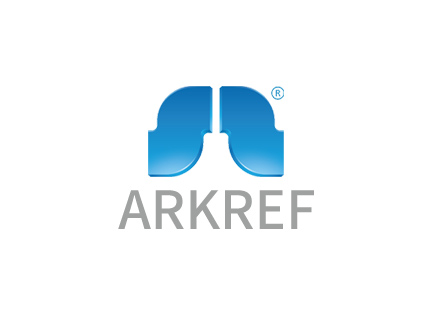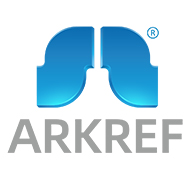Industrial Chiller Advancements Celebrate Global Success
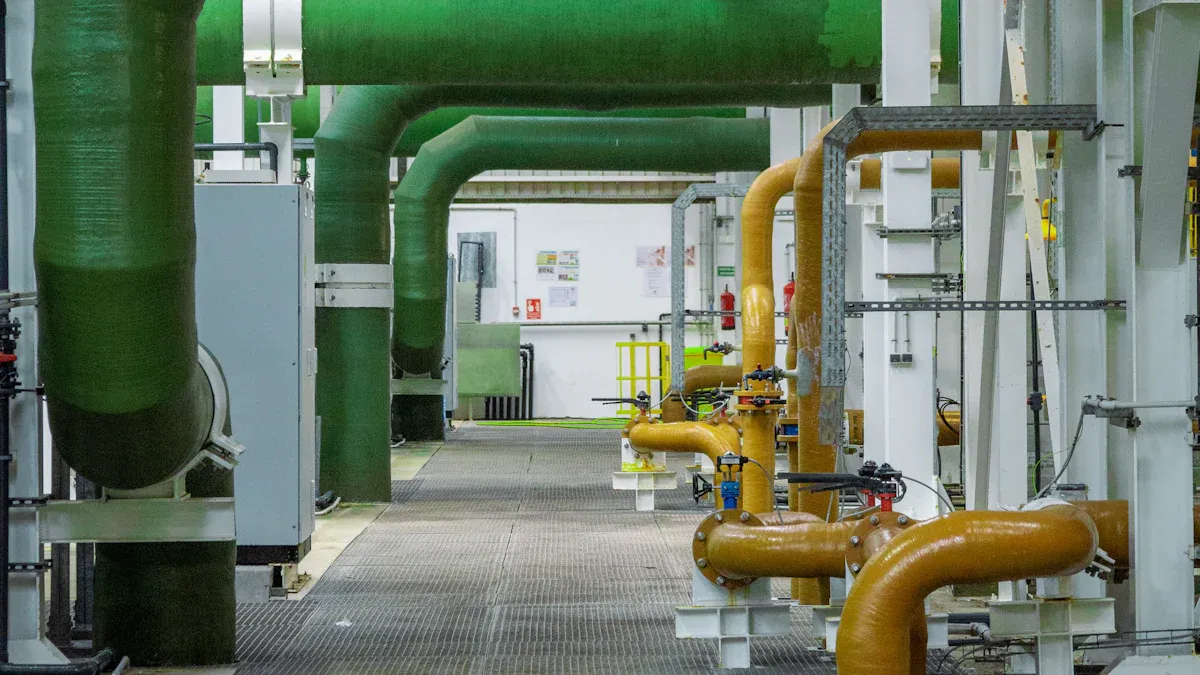
Industrial chiller improvements in 2025 changed cooling systems in industries.
Big steps were made in saving energy and helping the planet.
Immersion cooling lowers data centre building costs by half.
It also reduces server work by 10-20% and power use by 50%.
These ideas won awards like the JSRAE Technology Award.
They also earned the Ringier Technology Innovation Award.
New technology makes chillers more accurate and efficient.
This helps create a greener and cheaper future for everyone.
Key Takeaways
Industrial chillers in 2025 made big improvements in saving energy and protecting the environment.
New tools, like eco-friendly refrigerants, cut CO2 emissions and make cooling better.
Accurate cooling systems keep temperatures steady within ±0.08℃, helping delicate machines work well.
Prize-winning chillers show the industry's focus on being green and creative, helping the Earth and companies.
Picking updated chillers can save money and help industries be more eco-friendly.
Global Recognition of Industrial Chillers
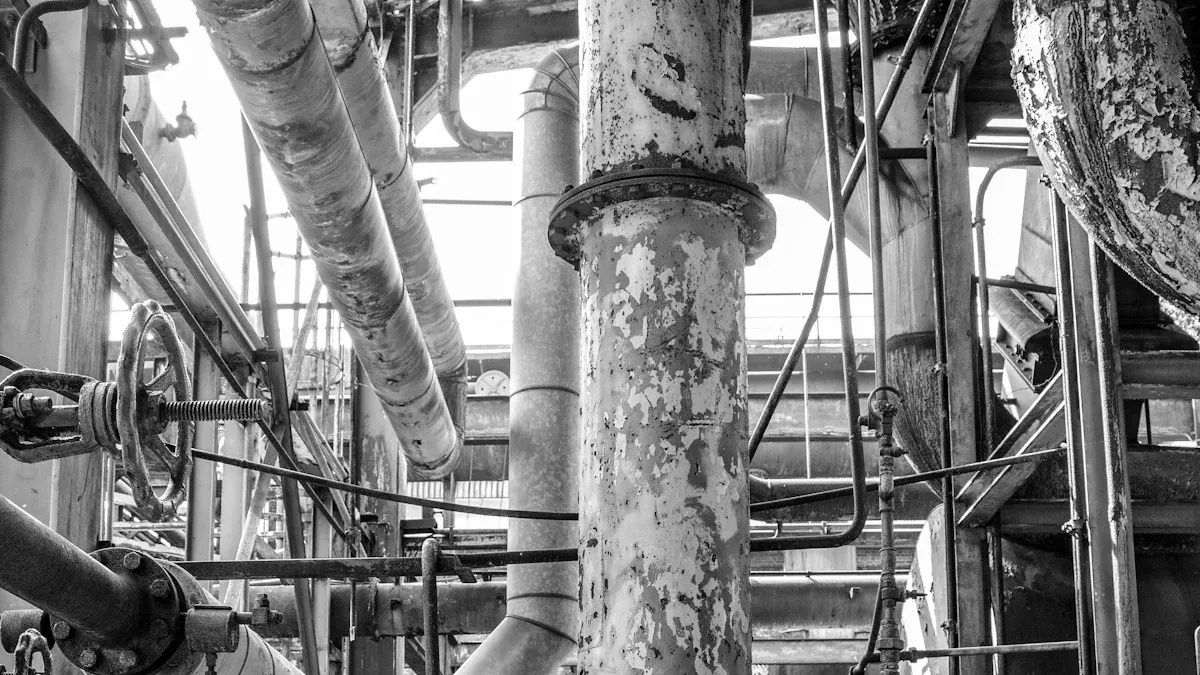
Prestigious Awards in 2025
In 2025, industrial chiller advancements earned worldwide praise through major awards. These awards showed the industry's focus on saving energy and protecting the planet. They proved how new ideas not only improve technology but also encourage more progress in cooling systems.
The Minister of the Environment Award for Climate Action was a key honour. It highlighted how large-capacity centrifugal chillers help fight climate change. Using advanced technology, manufacturers met strict environmental rules while delivering top performance.
JSRAE Technology Award for Low-GWP Centrifugal Chillers
The JSRAE Technology Award in 2025 recognised Mitsubishi Heavy Industries Thermal Systems for its JHT-Y/JHT-YI chillers. These chillers use the low-GWP refrigerant HFO-1234yf, setting a new standard for energy-saving and eco-friendly cooling.
It’s amazing that the constant-speed model reached a COP of 6.4. The inverter-equipped model achieved an IPLV of 8.8, showing great efficiency. Switching to the JHT-YI series can cut yearly energy use and CO2 emissions by about 65%. This proves how awards push the use of greener technologies.
Metric | Constant-Speed Model | Inverter Model |
|---|---|---|
Rated COP | 6.4 | N/A |
IPLV | N/A | 8.8 |
Maximum Part-Load COP | N/A | 24.9 |
Energy Use Reduction | N/A | 65% |
Ringier Technology Innovation Award for Precision Cooling
The Ringier Technology Innovation Award celebrated new ideas in precision cooling, especially for data centres. This technology changed cooling systems by offering cheaper, flexible, and strong solutions. These improvements solve problems like fan shaking, dust, and overheating.
Precision cooling systems lower data centre building costs by up to 50%. They also reduce server work by 10-20% and cut power use by 50%. These systems are ready for the future, cooling powerful servers with warm water. They can be installed anywhere in just three months.
Feature | Description |
|---|---|
Cost-Effective | Cuts data centre construction costs by up to 50%. |
Scalable | Allows growth as operations expand. |
Resilient | Eliminates fan vibrations, dust, moisture contamination, oxidation risks, and hot spots. |
Fast and Flexible | Enables data centre setup in virtually any environment within three months. |
Power-Efficient | Reduces server load by 10-20% and average power use by 50%. |
Future-Proof | Capable of cooling powerful servers (100kW/rack with warm water). |
These awards show how industrial chillers keep improving, setting new levels for efficiency, accuracy, and sustainability.
Technological Innovations Driving Success
Using Low-GWP Refrigerants like HFO-1234yf
Old refrigerants harm the environment. New chillers now use HFO-1234yf. This refrigerant has much lower global warming potential than older ones. It helps cooling systems work well while being eco-friendly.
Low-GWP refrigerants are changing cooling systems. They meet strict environmental rules and still work efficiently. For example, chillers with HFO-1234yf cool well and cut CO2 emissions. This change fights climate change and keeps chillers sustainable for the future.
Better Energy Efficiency and Performance
Modern chillers save energy and work better. Inverter models are a great example. They reach an IPLV of 8.8 and a part-load COP of 24.9. These numbers show how efficient they are.
Energy-saving chillers lower costs and use less power. They can cut yearly energy use by 65%. This saves money and reduces carbon emissions. The chiller market is growing fast, from $3.4 billion in 2024 to $6 billion by 2034. This shows industries want energy-efficient cooling systems.
Precision Cooling with ±0.08℃ Accuracy
Precision cooling keeps temperatures very steady, within ±0.08℃. This helps sensitive equipment like servers and factory machines work well.
These cooling systems stop problems like overheating and dust. They are strong, flexible, and fit different places. They also handle high cooling needs, making them perfect for industries needing exact temperature control.
Precision cooling does more than just cool. It lowers server work and power use, saving energy and money. These systems are the future, mixing accuracy and eco-friendliness for modern needs.
Environmental Impact of Industrial Chiller Advancements
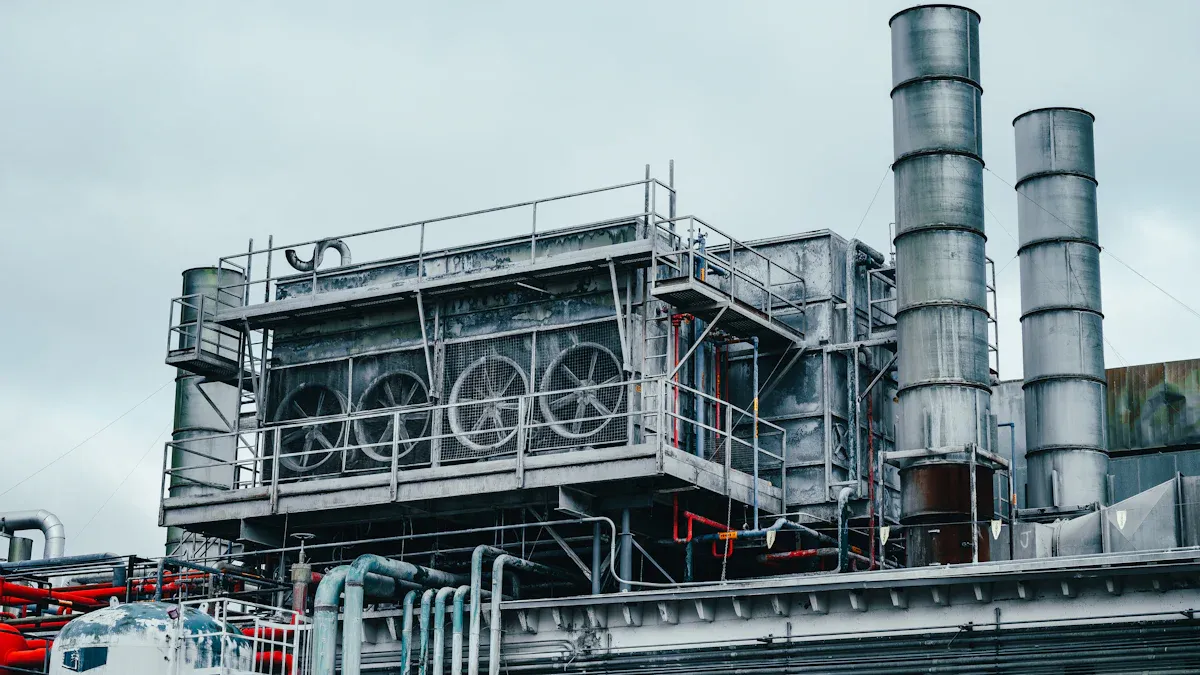
Cutting CO2 Emissions with Green Technologies
In 2025, industrial chillers helped lower CO2 emissions greatly. One example is the University of Wolverhampton’s £11m project. This plan cuts over 1,000 tonnes of carbon yearly. It shows how green cooling tech helps the planet.
New chillers use refrigerants with low or no Global Warming Potential (GWP). Ammonia and carbon dioxide are popular choices now. They harm the environment less and reduce emissions. Companies like Unic Air use CO2 refrigerants. This proves that being eco-friendly and efficient works together.
Meeting Global Environmental Rules
How do chillers follow strict environmental rules? They use smart designs and green refrigerants. Ammonia is a great example. It doesn’t harm the ozone and has very low GWP. This makes it perfect for meeting global agreements like the Kigali Amendment.
By using these technologies, companies meet rules and perform well. This helps the planet and boosts their reputation. It shows they care about sustainable practices.
Helping Industries Go Green
Industrial chillers are changing how industries stay eco-friendly. They help factories and data centres save energy and cut emissions. These systems lower costs and reduce harm to the environment.
Natural refrigerants like ammonia and CO2 are key to this change. They show a move towards greener, smarter solutions. As industries use these, they join a global push for sustainability. This helps create a cleaner world for future generations.
Broader Implications for Industry Applications
Role in Air Conditioning and Process Cooling
Industrial chillers are important for air conditioning and cooling processes. For example, the Magnitude WME-D chiller uses advanced compressor technology. This design saves up to 40% more energy than older compressors. Using such chillers lowers energy use and costs while keeping cooling effective.
The process cooling market is growing due to new technologies. Magnetic bearing chillers and IoT features improve efficiency and reliability. These upgrades make cooling systems better for industrial needs. By 2030, the market size may reach USD 6.3 billion, with a growth rate of 5.5%.
Benefits for Manufacturing, Data Centres, and Dairy Operations
Industrial chillers help many industries like manufacturing, data centres, and dairy farms. In factories, chillers keep machines and processes at the right temperature. This improves product quality and reduces machine downtime.
Data centres use chillers to cool servers and save power. These systems stop overheating and dust problems, making them great for high-tech environments. Dairy farms use chillers to keep milk fresh and safe for consumption.
Industrial chillers are useful in many industries. They save energy, cut costs, and adapt to different needs, showing their value in modern applications.
Future Trends in Modular and Scalable Chiller Systems
Modular and scalable chillers are the future of cooling systems. These chillers can grow as businesses expand, offering flexibility and saving money.
Metric | Value |
|---|---|
Projected Market Size | |
Current Market Size | USD 2.93 billion |
Compound Annual Growth Rate (CAGR) | 6.33% from 2024 to 2032 |
Higher energy costs and eco-friendly goals encourage modular systems. These chillers work well for construction projects and automated industries. They provide efficient cooling for changing needs.
Choosing modular chillers is a smart investment for the future. They are flexible, eco-friendly, and designed to meet growing demands. This makes them ideal for industries balancing performance and sustainability.
Industrial chillers in 2025 changed cooling systems greatly. Award-winning ideas made cooling more eco-friendly and efficient. These improvements help with precise cooling and cut harm to the planet. Using these chillers saves money and supports greener methods. Supporting these technologies helps build a cleaner future for everyone.
Industrial chillers show how important they are for saving energy and protecting the planet.
FAQ
What is an industrial chiller?
An industrial chiller cools machines and processes by removing heat. It uses special liquids to move heat away and keep temperatures steady. These chillers are used in factories, data centres, and food production.
How do industrial chillers save energy?
Modern chillers have smart features like inverter compressors and green refrigerants. These upgrades cut energy use by up to 65%. They help you spend less money and lower pollution.
Are industrial chillers good for the environment?
Yes, many chillers now use eco-friendly refrigerants like HFO-1234yf and CO2. These materials cause less harm to the planet. They help industries follow environmental rules and reduce harmful gases.
Which industries use chillers the most?
Factories, data centres, and dairy farms depend on chillers. They keep machines cool, servers running well, and milk fresh. Chillers can be adjusted to fit different cooling needs.
Can chillers control temperatures very accurately?
Yes, precision cooling systems keep temperatures steady within ±0.08℃. This makes them perfect for delicate machines like servers and factory equipment. They ensure reliable and consistent cooling.
See Also
Choosing The Right Industrial Water Chiller Units Effectively
Discovering The Impact Of ARKREF CO₂ Refrigeration Across Industries
Improving Industrial Cooling Solutions Using ARKREF CO₂ Units
Reasons The CO₂ Cascade Refrigeration Unit Thrives Today
Three Cutting-Edge CO₂ Transcritical Refrigeration Projects Featuring ARKREF
